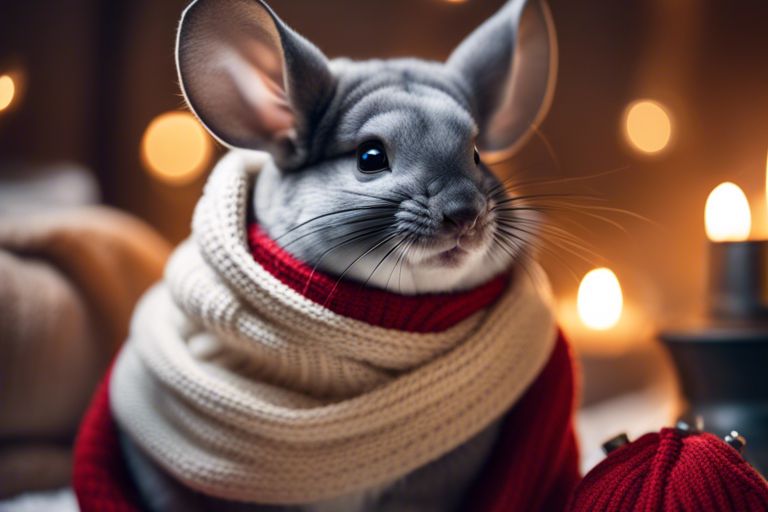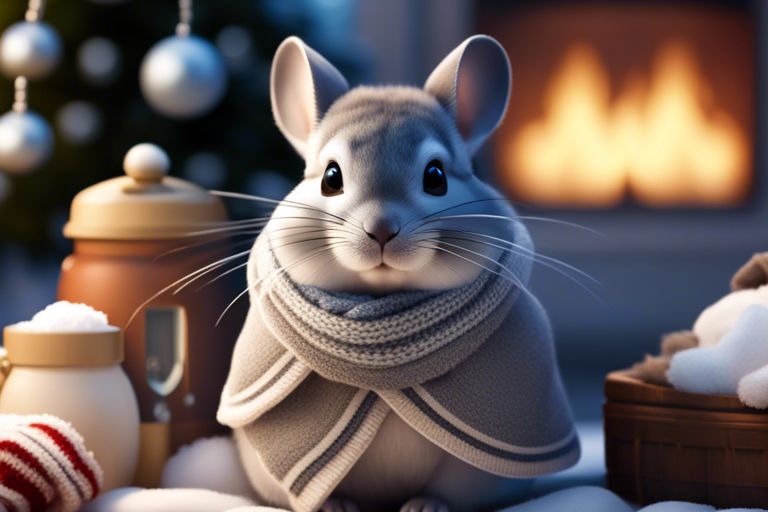Prepare to enhance your chinchilla care regimen with these important tips to navigate the frosty winter months. Winter can be a challenging time for these small, delicate creatures, but with the right knowledge and precautions, you can ensure your chinchilla stays healthy and happy throughout the season. From maintaining the right temperature in their habitat to adjusting their diet and grooming routine, these crucial tips will help you provide the best care for your furry friend during the colder months. Read on to discover the most important strategies to keep your chinchilla cozy and thriving this winter.
Key Takeaways:
- Provide sufficient bedding: Chinchillas need a thick layer of bedding to keep warm during the winter months.
- Monitor humidity levels: Keep the humidity in your chinchilla’s environment between 30-50% to prevent respiratory issues.
- Offer extra hay and water: Ensure your chinchilla has access to plenty of hay and fresh water to help maintain their body temperature and hydration levels.
Maintain Warm Temperature
| Avoid drafts | Use safe heaters |
| You’ll want to ensure that your chinchilla’s cage is placed away from drafty areas to prevent them from getting cold. Drafts can lead to health issues like respiratory infections, so it’s crucial to keep their environment draft-free. | Even though chinchillas are sensitive to high temperatures, it’s important to keep them warm during the winter. To maintain a safe temperature, opt for safe heaters like ceramic heat emitters or heating pads specifically designed for small animals. These heaters can provide a consistent and gentle source of warmth without posing a fire hazard. |
Avoid drafts
You’ll want to ensure that your chinchilla’s cage is placed away from drafty areas to prevent them from getting cold. Drafts can lead to health issues like respiratory infections, so it’s crucial to keep their environment draft-free.
Use safe heaters
Even though chinchillas are sensitive to high temperatures, it’s important to keep them warm during the winter. To maintain a safe temperature, opt for safe heaters like ceramic heat emitters or heating pads specifically designed for small animals. These heaters can provide a consistent and gentle source of warmth without posing a fire hazard.
Provide Cozy Bedding
Thick Fleece Liners
Any chinchilla owner knows the importance of providing cozy bedding for these adorable pets, especially during the winter months. Thick fleece liners are an excellent choice for chinchilla bedding as they are soft, absorbent, and help to retain heat, keeping your chinchilla warm and comfortable in colder temperatures.
Extra Nesting Materials
An vital part of chinchilla care is ensuring they have adequate nesting materials in their habitat. Extra nesting materials such as hay, shredded paper, or fleece strips provide your chinchilla with options to create a warm and cozy nest to snuggle in during the chilly winter nights.
Clearly, chinchillas are meticulous groomers and builders, and providing a variety of materials for them to arrange as they please can help fulfill their natural behaviors while keeping them warm and content.
Cozy bedding is not only vital for your chinchilla’s comfort but also plays a crucial role in their well-being during the winter season. Make sure to regularly check and clean the bedding, provide fresh materials, and monitor your chinchilla’s behavior to ensure they are happy and healthy.

Monitor Humidity Levels
Once again, it is crucial to monitor the humidity levels in your chinchilla’s living environment during the winter months. Proper humidity levels are important for your chinchilla’s health and well-being.
Use humidifier
Humidity levels should ideally be maintained between 50-70% to prevent respiratory issues and dry skin in your chinchilla. Using a humidifier can help regulate the moisture in the air and create a comfortable environment for your pet.
Avoid dampness
Avoid creating dampness in your chinchilla’s cage or living space as it can lead to mold growth and respiratory problems. Ensure that bedding is kept dry and clean, and regularly check for any signs of moisture buildup.
This can be especially dangerous during the winter when condensation can form on surfaces due to temperature variations. Make sure to address any dampness promptly to maintain a healthy environment for your chinchilla.
Ensure Nutritious Diet
High-quality pellets
Many chinchilla owners may not realize that the foundation of their pet’s diet should be high-quality pellets. With a good balance of fiber, protein, and nutrients, pellets provide vital nutrition for chinchillas. Look for pellets specifically formulated for chinchillas and ensure they are fresh to provide the best quality for your pet.
Seasonal veggies
Nutritious seasonal veggies are a great addition to your chinchilla’s diet. Nutritious options like dark leafy greens, carrots, and bell peppers can offer added vitamins and minerals to support your chinchilla’s overall health. Remember to introduce new vegetables slowly to avoid digestive upset, and always wash them thoroughly to remove any pesticides or dirt.
High-quality fresh hay should always be available for your chinchilla to help aid in digestion and maintain dental health. Avoid feeding your chinchilla sugary fruits or vegetables like grapes or bananas, as these can cause digestive issues and lead to weight gain.
Keep Water Unfrozen
Insulated bottles
Now, one of the most important aspects of winter chinchilla care is ensuring that your chinchilla has access to unfrozen water. Insulated water bottles are a great investment during the winter months as they help keep the water from freezing for longer periods of time. This ensures that your chinchilla stays hydrated and healthy throughout the cold season.
Water checks
Now, you’ll want to regularly check your chinchilla’s water supply to make sure it has not frozen over. It’s crucial to monitor their water intake, as dehydration can lead to serious health issues. Chinchillas can quickly become dehydrated if they do not have access to water, so it is important to check their water bottles often and replace any frozen water with fresh, unfrozen water.
You can also place the water bottle in a warm environment, away from drafts, to help prevent freezing. Additionally, using a small water bowl in addition to the bottle can provide another water source in case the bottle does freeze over.
Offer Chewable Accessories
Wooden toys
For chinchillas, providing chewable accessories is crucial to their physical and mental well-being. Wooden toys are an excellent option as they satisfy your chinchilla’s instinct to gnaw while also helping to keep their teeth in check. Make sure the wooden toys are untreated and safe for your pet to chew on. Rotate the toys regularly to keep your chinchilla engaged and prevent boredom.
Pumice stones
Accessories such as pumice stones are another great addition to your chinchilla’s cage. While they may not be chewed on as frequently as wooden toys, pumice stones provide a rough surface that helps wear down your chinchilla’s continuously growing teeth. They also offer a good source of minerals, which can be beneficial to your pet’s health.
While pumice stones are safe for chinchillas to use, it’s important to monitor their condition regularly. Replace the pumice stone if it becomes too worn down or small enough for your chinchilla to swallow. Always ensure the stone is securely attached to the cage to prevent any accidents.
Limit Bath Dust
To ensure the well-being of your chinchilla during the winter months, it is crucial to limit their exposure to bath dust.
Reduce frequency
To prevent over-drying of your chinchilla’s skin in the dry winter air, any unnecessary dust baths should be avoided. While dust baths are imperative for chinchilla grooming, during winter, it is advisable to reduce the frequency to once a week.
Controlled environment
Limit the time your chinchilla spends outside the controlled environment of their cage during the winter. This means preventing them from rolling in dust excessively, which can lead to skin irritation and respiratory issues.
A controlled environment with proper humidity levels is imperative for your chinchilla’s health during the winter months. Consider using a humidifier to maintain the ideal humidity level in their living space.
Secure Outdoor Enclosures
Solid construction
Not all outdoor enclosures are created equal, especially when it comes to the safety of your chinchilla. You should opt for enclosures made of solid construction materials like metal or heavy-duty plastic to prevent any escapes or intrusions from predators. Ensure that the bars are close enough together to prevent your chinchilla from squeezing through or getting stuck.
Weatherproof covers
Not all weather conditions are suitable for chinchillas, so any outdoor enclosure should include weatherproof covers to protect them from rain, snow, and extreme temperatures. These covers should be made of durable materials that can withstand the elements while providing proper ventilation for your pet.
Weatherproof covers not only shield your chinchilla from harsh weather but also serve as a barrier against potential predators. They provide added security and comfort for your furry friend, ensuring they can safely enjoy the great outdoors.
Perform Regular Health
Checkups
Performing regular health checkups on your chinchilla is crucial to ensuring their well-being during the winter months. All chinchillas should have a thorough checkup with a veterinarian specializing in exotic pets at least once a year. This will help to catch any potential health issues early and address them before they escalate.
Body inspections
Even though chinchillas are relatively low-maintenance pets, it is vital to regularly perform body inspections on them, especially during the winter. Use this time to examine their fur, eyes, ears, and overall body condition. Pay close attention to any changes in eating habits, behavioral patterns, or physical appearance. These small details can often indicate underlying health problems that require immediate attention. Regular body inspections can help you stay proactive in your chinchilla’s care and ensure they stay healthy throughout the season.
Summing up
The 10 important tips provided for winter chinchilla care are crucial in ensuring the health and comfort of your furry friend during the chilly season. By following these guidelines, you can protect your chinchilla from potential risks like drafts, dehydration, and temperature fluctuations. Remember to provide a warm, cozy environment, monitor their water intake, and pay attention to any signs of distress. Taking proactive steps to care for your chinchilla in winter will help them thrive and stay happy throughout the colder months.
